Nuts, looks like I can’t outsource this job yet.
The usual disclaimers: I am just one guy trying to cover too much news: I will undoubtedly miss things. And you, dear reader, are invited to submit anything I’ve missed in the comments—if I agree that it should’ve been covered, I’ll add it to the main article as soon as I can.
Brand-new disclaimers: I’ve been more of a participant in the crossword scene than in years past, which means I occasionally have to report on myself here—I’ll do my best to do so without bias (relying on Janice’s edits to rein me in if need be). Also, some crossword chatter now takes place in areas that I can’t easily track—more on that in the “Socials” section. Let’s dive in…
New Puzz, Yo
2023, otherwise known as “the last sort-of-peaceful year in American politics,” was a relatively peaceful year for puzzles, too. And as it was for puzzles at large, so it was at the New York Times office. After the high of “Hot Wordle Summer” and the low of the “swasticrossword” snafu, 2023 settled into enviable stability for NYT Games. The tone of outside coverage got less “wow” and “ugh” and more “hmmm.” As in, “Hmmm, nice operation they’ve got over there. How can we get us some of that?”
It’s that impulse that led Apple News to launch its own crossword feature, with puzzles from freelance pros like Nate Cardin and Brooke Husic, while Hearst acquired Puzzmo, a new online puzzle suite designed by acclaimed game-maker Zach Gage with engineer Orta Therox, including crosswords outsourced to AVCX.
Of these two big launches, Puzzmo seems the more interesting and experimental. Its crossword grids use bars as well as blocks in a new but intuitive way: the bars appear to signify a dividing space in a multi-word answer or the use of an acronym or abbreviation. It also integrates hints and constructor notes in new ways.
The other games on the site are intriguing as well, and some of them, like Really Bad Chess and Typeshift, have already been successes for Gage as individual features.
Some of the publicity surrounding the launch tried to paint Puzzmo as a “tightly knit alternative” to NYT’s bland “links to games.” It’s true Puzzmo is more visually dynamic and the NYT interface could use some work—it doesn’t even have an “all our games” section separate from its main crossword page.
But when Gage talks about how his mother was inclined to try different puzzles in the print newspaper because they were “just there,” all part of one integrated experience, he doesn’t seem to be describing Puzzmo’s current interface. There, you have to click off the main page to start doing any puzzle, and you have to hop back to that main page and then off again to do any other puzzle.
The NYT could stand to make it easier to hop between its puzzles, but it does havesome intrapuzzle links, stable URLs for each puzzle, and a mobile app. Puzzmo has none of the above, though it does have a front page that looks more dynamic and integrated.
In creativity of design and the puzzles themselves, Puzzmo is a worthy rival. In terms of UI, neither covers themselves in glory, but the NYT has the edge in ease of use. I’d like to see Puzzmo succeed, which is why I hope that going forward, it’ll play to its real strengths and exploit its competition’s real weaknesses.
Like acrostics, for instance.
Double-Crossed’ics?
This year, the NYT decided to cut acrostic, cryptic, and variety puzzles from its digital offerings, while continuing to present them as printed offerings. No, I didn’t get those two adjectives mixed up.
Nobody would call acrostics the sexiest part of the NYT’s offerings, and they could be challenging to render well in a mobile format. But they have a history nearly as venerable as the crossword proper. And putting them only in print is even stranger a compromise than it is for variety and cryptic puzzles, because all but the most die-hard print fans will admit acrostics are far easier to solve online than off. The main options for doing so now are The Wall Street Journal, the work of Puzzle Baron, and now, Alex Boisvert’s subscription service at Crossword Nexus.
Boisvert started up that last one as a response to the NYT situation. I proposed a new, smaller acrostic format as another alternative but haven’t had time to follow up on that yet. Maybe in 2024.
Acrostic-makers Emily Cox and Henry Rathvon announced their retirement from the feature around the same time, though the print feature continues (and still gets online commentary from the NYT’s own team). They used some of the resulting free time to build their own website (with Lukas Karlsson), showing an archive of printable variety puzzles that goes back to 1977, and retired from their remaining venues more recently. (Photo source.)
Nobody Knows What’s Up With XWordInfo, Not Even XWordInfo
NYT followers faced the possibility of losing another resource before 2023 was done. The NYT didn’t kill this one and in fact may yet save it. Hope springs eternal. But it seemed dead for a while, and now its future hangs by a thread.
The resource in question is XWordInfo, self-described as “the essential resource for crossword constructors and enthusiasts.” At this writing, XWordInfo contains records of every NYT crossword published since the NYT started publishing crosswords, along with numerous statistics and search features. It’s pretty much invaluable to anyone studying the field: I’ve consulted it countless times.
As discussed in this audio interview, site creator Jim Horne and later assistant Jeff Chen have wearied of the work involved in maintaining the site, a workload far heavier than most observers imagine. Jeff has moved on, but Jim has so far kept the site going with disclaimers that updates may become “sporadic and not guaranteed” after a given date—a date that, for now, continues to retreat into the future.
I spoke briefly with Jim about this situation, and he’s continuing to keep the lights on as long as there’s a reasonable chance of selling the site to someone with the resources and coding chops to maintain it. The NYT would be such a someone, and securing all the info on XWordInfo would do a lot to maintain a history that has aided its legacy and brand.
If only we could count on the NYT to follow enlightened self-interest, all the time.
Making Connections
One thing the NYT did very right in 2023 was develop its puzzle section further. Nobody expected that 2023 would see another hit like 2022 Wordle, but Connections was a modest success for the service and inspired a fair amount of chatter. The structure, arranging sixteen elements into four rows, is crossword-adjacent enough that I think it merits mention here.
Wyna Liu explained the feature and how she created it. After a trial run, it soon moved to the main app. The puzzle continues to win many fans, even though it bears some similarity to the BBC’s Only Connect game show and, beyond that, isn’t for everyone. If you like the idea of the feature, you can create your own.
The NYT has also launched a newsletter called Easy Mode, written by new hire Christina Iverson. The newsletter includes Friday and Saturday NYT crosswords that Iverson has reclued for relative beginners (generally without the original constructors’ participation, for better or worse). It also pushed a more competitive Wordle play-style called Wordle Golf.
If you’re looking for more indie game variations, former constructor David Levinson Wilk has developed his favorite game, built around famous people’s initials, into the web app Initial Instinct. And CineNerdle/Cine2Nerdle takes Connections format a little further by having five rows, or rather, four rows that cross a column or three crossing two.
Other Publishing Moves
New in 2023: Caleb’s Inferno, Children’s Hospital LA Puzzle Pack*, Crossword Jam+ (app), Contest Crosswords Combating Cancer*, Daily Themed Crossword Puzzles (app), The Defector, Enigmatology, The FT World Puzzle (a supplement to the usual FT puzzle), Gothamist, Indian Express Mini, Puzzles for Democracy*, Reason, Soxwords, These Puzzl3s Fund Abortion*, TV Insider, University of Hawai’i. The starred features are puzzle collections for a cause.
No more in 2023: Of the crossword sites gathered as sources for Daily Crossword Links, about 64 of them seem to have not updated in 2023, with most coming to a halt in 2022. Three features, though, have given official farewell messages: The Inkubator, Crucinova, and Rossword Puzzles. The last of these ended because its creator Ross Trudeau had other things in the offing…things like editing the new crossword at Apple News.
New AND no more in 2023: Grids for Kids*, a set of 25 kid-friendly puzzles payable with $10 donations to children’s charities, launched in February. But after traffic and donations slowed down, the team let the domain name lapse.
Changings of the guard: Quite a few of those this year. Amanda Rafkin took over the USA Today editing reins from Erik Agard. Alan Connor took over The Guardian crossword from Hugh Stevenson. The WaPo’s Evan Birnholz went on paternity leave through the end of the year, but will return in 2024. Jeff Chen took over as editor of the 21x21 Universal Sunday Crossword, while David Steinberg continued editing the daily 15x15 Universal Crossword. Steinberg also officially ended his career as constructor. Kim Vu, AKA Hoang-Kim Vu, joined AVCX+ as an editor.
More Crowdfunding
Take 3 is a fully-funded Scrabble-like game still taking backers at this writing.
Peter Gordon funded another year of Newsflash Crosswords, and another year of A-to-Z small pangram crosswords, but the B-t-Z Vwllss Crsswrds—a hybrid between pangrams and vowelless crosswords—didn’t raise enough to join those two mainstays.
The Millennium Bomb Gamebook, a “Scrabble-like, crossword adjacent, narrative gamebook that pits you against a deranged A.I. at the beginning of the world,” is a weird kind of fusion cuisine. Not gonna lie: I love crosswords, comics, and science-fiction and fantasy, and I still find this project tough to get my head around. But for some backers, I’m sure that was part of the thrill.
Tourneys
Dan Feyer secured his ninth win at the ACPT…by one second. There’s further ACPT coverage here, and I have a personal account of the weekend here. Today had a video interview with Feyer here.
Announcing the new Westwords Tournament, coming 2024 to Berkeley, California! Information is a bit spotty as yet, but it’s in partnership with Boswords, and that’s a good sign.
Puzzles from Lollapuzzoola 2023 are still available. There’s not much official coverage, but you might enjoy the snapshots from its Facebook page.
The Bryant Park Crossword Tournament, an unusually outdoorsy event, was photographed here.
Matthew Marcus won the UK-based Times Crossword Championship, despite hailing from Portland, Oregon.
A Clue A Day, a daily cryptic-solving event that ran through most of 2023, was aimed at younger and older Indian solvers.
Adya Singh won the Extra C Cryptic Crossword Contest held in New Delhi.
The National Intercollege Crossword Expedition 23 announced winners Shubham Kumar and Pankaj Kumar of the Nalanda College of Engineering, with Ujjawal Surya and Aman Kumar and runners-up.
Records
First NYT puzzle to feature the word “toilet” twice in the same clue: It’s March 30, 2023 (34 Across). But when will we see “Toilet toilet toilet”?
First live, in-person cryptic crossword solvealong: Josh Spero organized this one. I assume he means “as an official event,” because otherwise, I was organizing cryptic solvealongs all the time when I was riding trains near Oxford.
Number of crossword forms invented: Eric Berlin’s list of seven at least seems hard to top. You can get his own collections here.
Trend of the year: Strategic difficulty areas. Caleb Madison played with a puzzle that gets more difficult as you descend it in his new feature Caleb’s Inferno. And in “’Tis the Season,” Erik Agard’s USA Today puzzle for Martin Luther King Day, Agard divided his grid into two halves—one easy, one hard—joining them with the entry THE OTHER AMERICA to make a point about how much harder things can be in the reality some of us occupy.
“Story crossword”: This NYT puzzle from Alex Eaton-Salmers strung every single Across answer into a series of fill-in-the-blanks that could be read as a beginning-to-end story.
The results didn’t get a ton of praise overall—Rex Parker, never an easy-to-please critic, labeled it “one of the worst solving experiences of all time.” Jeff Chen was kinder, calling it an innovative concept from a brilliant mind, though even he admitted he wasn’t too into the story. (I published a narrative puzzle that I feel suffered from too many constraints this year, so I’m sympathetic.)
Dan Feyer mentioned a tougher version of the same idea from the 2002 ACPT, but in that puzzle, the story flows a lot better, no doubt due to the freedom the writer had to use the crossword’s words out of order. I would suggest indie puzzlemakers try other versions of this structure. They have the ability to use longer clues, which might reduce the random elements enough to smooth out the solving experience.
Largest crossword ever: The Ubercross Abecedaria. With 116,370 clue-answer pairs in its 25 interlinked parts, this puzzle beats out every current record-holder in Guinness (the online record, the published record, and the unpublished record). Still waiting on Guinness to say so, but that’s on its way. And oh, yeah, full disclosure, it’s by me.
Software
David Astle tested ChatGPT’s cryptic-clue writing abilities and found them wanting. Chris Lancaster found it not too great at solving them, either, and Ethan Molick confirmed. Reviews of apps like Crossword Solver AI cast further doubt on the whole “AI revolution in solving.”
Actually, wordplay-related tasks like crossword-solving are proving to be a great Turing test for overhyped software. They show a deep understanding of language that “spicy autocorrect” lacks:
Rowdy Vass, on the other hand, claims to have gotten decent results with his ChatGPT-supported software, which isn’t meant to do the puzzle for you but to train you to do it better.
A review determines that the Kindle Scribe is good at marking crossword PDFs without one having to print them out—and precious little else.
AmuseLabs’ online-crossword-making software developed support for Schrodinger puzzles.
New York Magazine teamed up with Blackwing to market its own crossword pencil. (It’s a simple kind of solving technology!)
Spread the Wordlist posted an update to its wordlist. So did et tu, etui.
Cross-Media
Books
Will Must Send Regrets: 101 Rejected Crossword Puzzles and the Stories Behind Them by Damon Gulczynsk (technically published December 31, 2022, but let’s not be total sticklers) is a “two-decade tale of repeated but endearing failure.” It’s hard to make me a better pitch than that.
Crosswordese: A Guide to the Weird and Wonderful Language of Crossword Puzzles by David Bukszpan is a smart examination of its subject that integrates crosswordese words and clues into free-flowing essays. Check out how Bukszpan uses clues for NEWS in the selection below:
Also of note: Vox’s crossword feature ventured into print. Francis Heaney pays tribute to two nostalgia-filled decades with Grids Just Wanna Have Fun and New Grids on the Block. And Stella Zawistowski’s Tough As Nails crossword collection is marketed with an intriguing personal touch.
Magazines
The 836th entry in the New Yorker’s usual caption contest had these results.
Music
Borrowing a page from Taylor Swift’s playbook, Carly Rae Jepsen used a “crossword” (really a criss-cross) to build anticipation for her latest album. Then Kwon Eun Bi did the same.
This link will take you to “Crossword Boss” performed live by the Sam Grisman Project. Note that this is part of an hour-long set of music.
The Japanese star Mafumafu released the song “Crossword Puzzle” (sung by Riimu) with a kickin’ video below. The translated lyrics aren’t essential, but just in case, here they are.
Hwang Min Hyun’s “Crossword” is just pretty to me, too, even if my Korean is no better than my Japanese (which is to say, nonexistent).
TV
Crosswords make an appearance in Sex Education 4.4: Maeve uses them to escape from the reality of her mother’s passing. It turns out they’re also a pastime for Maeve’s actress, Emma Mackey.
A criss-cross challenge was the final, race-winning challenge on the latest Amazing Race Canada. The winning contestants had to build a grid out of answers relating to their prior race experiences.
Crosswords also play a role in the romantic bonding in Daisy Jones and the Six. No finale spoilers!
Pat Sajak has announced the next season of Wheel of Fortune will be his last. In line to replace him? Ryan Seacrest.
While on strike and raising money for actors’ rights to a fair wage, Russian Doll and Poker Face star Natasha Lyonne auctioned off chances to do a crossword with her. The winning bid was $6,300. (That’s too rich for my blood, and I don’t really need that much help solving—but the prospect of making a crossword with her would be worth something to me. It wouldn’t be her first.)
Similarly, the NYT allowed users the chance to play puzzles with Keegan Michael Key through much of June.
(Non-Music) Videos
“How one guy changes the mood of the whole train car through a crossword puzzle”:
Games
Winning Moves Monopoly Scrabble is just what it says it is, a fusion of two of the most popular board games. Some would say an unholy one.
One story I see a lot when researching these roundups is the crossword puzzle that doubles as a secret proposal, designed or commissioned by a romantic guy who wants to make that special moment unforgettable. This year, it happened again…in the video game Yakuza 0. In a comical side story within a larger gangster epic, you have to provide the right answers to the crossword, or poor Kosaku may never be able to express his feelings to his love Shizuku!
Online
New online series include Chris King’s column “Chris Words” at Questionist and “The Puzzler,” a new podcast by A.J. Jacobs.
Widely-Discussed Clues
Strike underminer (SCAB, Washington Post…shortly after its own strike)
Jennifer Garner and Mark Ruffalo film (2004) ([13] GOING ON [30]—13 and 30 are both clue numbers, Universal)
Imp opener, after some harrassment, embraces initially high-earning movie that premiered on July 21, 2023 (enumeration withheld) (BARBIE and OPPENHEIMER—unpublished two-way cryptic clue by Redditor noneuclidean)
Deputy ___ (L.A. Sheriff's Department subgroup such as the Executioners) (GANG, The New Yorker)
Perfectly acceptable, humorously (CROMULENT, NYT)
Actor Elba of “Cats” (IDRIS, NYT)
Odds and Ends
Crossword Backlash? No, crossword backsplash.
Immigration: Crosswords got Mangesh Ghogre the Einstein visa to emigrate to the U.S. Natan Last met with Ghogre and used his experience to half-report, half-meditate on how international the crossword can and should be. Ghogre, meanwhile, teamed with Brendan Emmett Quigley to publish a Taj-Mahal themed puzzle in the NYT for Indian Independence Day. (Boy, I hope XWordInfo is still here next year. It’s so useful for things like this.)
Dying to Solve: Jane Harding claims her dying mother solved a crossword answer while comatose. I…don’t mean to disrespect the grieving, but I’m dubious. The word “ethereal” sounds like sleep-mumbling to my ear—easy to get those two things confused, if you really want to hear a loved one’s voice.
History: A timeline of Guardian puzzles…with a few contributors whose real names are still unknown today. Everyman 4,000 featured clues from every setter who’s worked on the feature in its 78-year lifespan.
Cartography: Felt maps states by their number of crossword appearances.
Cryptic Education: Most cryptic-crossword clue types are well established, but a few aren’t. The Guardian explained “percentage clues” and “ellipsis clues.” The Spectator discussed various solving techniques, including brute-force, “biffing,” and changing tack. The Financial Times has a more basic intro to the topic.
New (Old) Challenges: Could You Complete a Crossword Puzzle from 1935? Or the first San Francisco Chronicle one from 1924? Or even the first crossword from 1913?
Old Challengers, New Tricks: The Telegraph Toughie celebrates 3,000 puzzles with—what else?—a really tough one. The MIT Mystery Hunt this year featured a few crossword variants that have to be seen to be believed. And the UK Times claims its Listener crossword is so hard people assume it’s MI5 code.
For Next Christmas: The art of giving puzzles as gifts.
Scholarship
Crossword Solver reviews what types of people are most represented in well-established, traditional crosswords. It’s concerned less with traditional demographics (race, age, gender) and more with the subject matter a person could be said to “belong” to (entertainment figures, political figures, sports names, et cetera).
Last year ended with a swastika-resembling crossword sparking condemnation (good) and conspiracy theories (not so good). This sensible piece from the Canadian Jewish News had a theory about why many on the left bought into the idea that it was deliberate.
What if you trained an LLM on a database of millions of crossword clue-answer pairs? “SLR: A million-scale comprehensive crossword dataset for simultaneous learning and reasoning,” by Chao Wang, Tinghui Zhu, Zhixu Li, and Jingping Liu, tried to find out.
The Naked Crossword Challenge took a group of experienced solvers and asked them to solve puzzles from six major venues, without telling them which crossword came from which venue. In this audio interview, Norah Sharpe reviewed the results.
Highlights of this survey of crossword solvers include data suggesting that Gen Z is far more into crosswords than millennials, and that 1 in 9 survey respondents had done solving in the bathroom.
“The Aesthetics of Crossword Puzzles,” by Robbie Kubala, studied “the intersection of the recently popular aesthetics of puzzles and games and the more familiar aesthetics of the visual and literary arts.”
In case the rest of this roundup isn’t nerdy enough for you, Weihao Su, Haiming Chen, Rongchen Li and Zixuan Chen presented “Modeling Regex Operators for Solving Regex Crossword Puzzles.”
The Atlantic dove into crosswords’ unspoken grammar.
People
Will Shortz has had quite a year. Celebrating 30 years as the NYT’s longest-serving crossword editor was the least of it. He came out as gay. announced plans to marry, and is donating land to his native Crawfordsville for a nature park. The park will have ping-pong tables, naturally. The NYT also turned his interview into a teen-friendly piece about seeking out your dream job. Partly in response, he took a few reader questions (and some from interviewer David Leonhardt).
That said, the days when Will was the only personality shaping the NYT puzzle section are behind us. (If they weren’t, we probably wouldn’t have gotten rid of those digital variety, cryptic, and acrostic puzzles, grumble-grumble-grumble.) The buck now stops with “head of games” Jonathan Knight, who gave many an interview of his own this year. The best profile of the whole team can be found in this Vanity Fair piece.
Besides Shortz and Knight, the most-profiled crossworder of the year was probably Juliana Pache, creator of Black Crossword, a series of minis dedicated to putting more Black culture into solvers’ vocabulary. She even got NYT executives to break their usual policy of sticking their fingers in their ears and pretending puzzles other than theirs don’t exist.
In a similar vein, Simon Burris of likewise Black-themed crosswords got some long-overdue attention—at 89, he’s a different generation than Pache, but their goals appear to be in harmony.
Okay, in fairness, the NYT did also acknowledge Rich Norris as he was honored with a MEmoRiaL Award.
The BBC profiled Robyn Weintraub’s creative process in this audio interview.
Noted crossword solvers: NHLer Bruce Cassidy, AHL team The Hershey Bears, filmmakers Rian Johnson and Rick Heinrichs, columnist Susan Keezer, cricketer David Warner, the late musician Shane McGowan.
The great-grandson of Margaret Farrar, the first NYT crossword editor, investigates his ancestor’s work.
Rita Ora talks to WSJ subscribers about, among other things, being a frequent crossword clue.
Other constructor/editor profiles: Katherine Baiker, Tracy Bennett (x2), Michael Berg, Patrick Blindauer, Billy Bratton, Addie Breen, Nate Cardin, Garrett Chalfin (x2), Elise Corbin (x2), Aidan Deshong, Steerpike/Brendan Donaghy, Sam Ezerky, Neville Fogarty, Rebecca Goldstein, Malaika Handa, Mike Hobin, Colin Inman, Christina Iverson, Matt Forest and Taylor Johnson, Matt Jones, Monk/Mark Kelmanson, “Lady Labyrinth” (an OpenAI-generated bio), Laura Braunstein and Jesse Lansner, Richard E. Maltby Jr., Mephisto/Paul McKenna, Myles Mellor, Ryder Musselman, Stan Newman, Kate Chin Park, Paolo Pasco, Amanda Rafkin, Merl Reagle (posthumously, with Marie Haley), Oliver Roeder, Nancy Serrano-Wu, Will Shortz again (x2), Grace and Greg Warrington, Robyn Weintraub, Steve Weyer, and graduates of the Diverse Crossword Constructor Fellowship (Mary Crane, Esha Delta, Isabella Khuu, Alice Liang, Manaal Mohammed, Gina Turner).
RIP: Nutmeg/Margaret Irvine, Jack Lance. Lance was 25.
Socials
Some of my favorite crossword social posts, in no particular order! One per author.
Sadly, newer platforms like BlueSky, Threads, Mastodon, and Discord, while not run by a spoiled racist plutocrat, do not have a straightforward “search by date” feature for the general public. BlueSky and Threads are open for all to read but not date-searchable; Mastodon and Discord are date-searchable but only readable when you’re a member of its server. There’s a date-specific “back door” in BlueSky search, but I learned about that one too late.) This made it basically impossible for me to go back more than a few days to find interesting stuff.
Yes, in spite of everything, Xwitter’s still winning against its rivals on searchability, for now. Here’s hoping other platforms improve in that regard, but until then…
Schadenfreude
Nothing too outrageous seemed to make it into print this year. There were minor blunders, to be sure. The Villages Daily Sun accidentally published a puzzle that was already filled in, Vulture’s mini crossword added an ADDS to its ADD, and the WaPo cut off the top row and title of one of its own puzzles, ironically titled “Director’s Cut.” And calling Wordle a 2022 “fad,” while technically correct, still has a kind of “shots fired” connotation, so maybe the NYT Crossword itself shouldn’t have done it.
Worst Solver: The woman described in this Dear Abby letter, who solves all the time to the exclusion of her husband and family, is at best falling into compulsion to avoid other realities. See, those 1920s articles about crosswords leading to the end of marriages were right all along! (Seriously, I hope her loved ones draw a hard line and get her any help she needs…assuming this letter is an accurate one. Two sides to every story!)
Most Controversial Answer: Where’s the line between reporting on controversy and trolling for controversy? I’m not always sure, but I feel like The Daily Mail’s crossword stories ran over that line this year and peddled some bigotry while they were at it. So…I won’t be linking to those!
Somewhat more merited was this reaction to a June 7 USA Today clue featuring PALESTINE as a “Neighbor of Jordan.” As Palestine is not an officially recognized country, this is a bit lopsided. It’s like describing Arizona as a “neighbor” of Mexico—only much more politically fraught, especially during the current times of war. Nobody claims Arizona should be recognized as its own nation, but in regard to Palestine, such recognition is a hot-button issue. (Texas is somewhere in between.) This is not the first time the answer PALESTINE has raised controversy, either.
On a lighter note, the term HOBBIT VILLAGE (NYT, November 6) attracted some lower-stakes criticism. It was never actually used by Tolkien (or Jackson).
Worst Answer: Newsweek did a short piece on the internet kerfuffle surrounding this odd children’s crossword with its seemingly unsolvable final answer.
It turns out the missing answer is RATTAN, a kind of wooden fiber that was used to beat misbehaving schoolchildren in the 1930s. Wow. That’s…um…ugh.
(An alternate proposal was to use SEA-DOG in place of SAILOR and EIGHTY in place of ELEVEN, freeing the last answer to be GRUMPY. But that doesn’t really match the bottom cartoon as well as…okay, let’s move on.)
Worst Crossword Feature: Crosscraft, an app that endorses the whole “Just let ChatGPT do your thinking for you!” policy with predictable results.
“Thanks” to lots of uninformed hype for AI and LLMs, I’m sure we’re going to see a lot more of these abominations. I don’t suppose you’d agree not to do that if I asked, ChatGPT?
Great. That’s…that’s great.




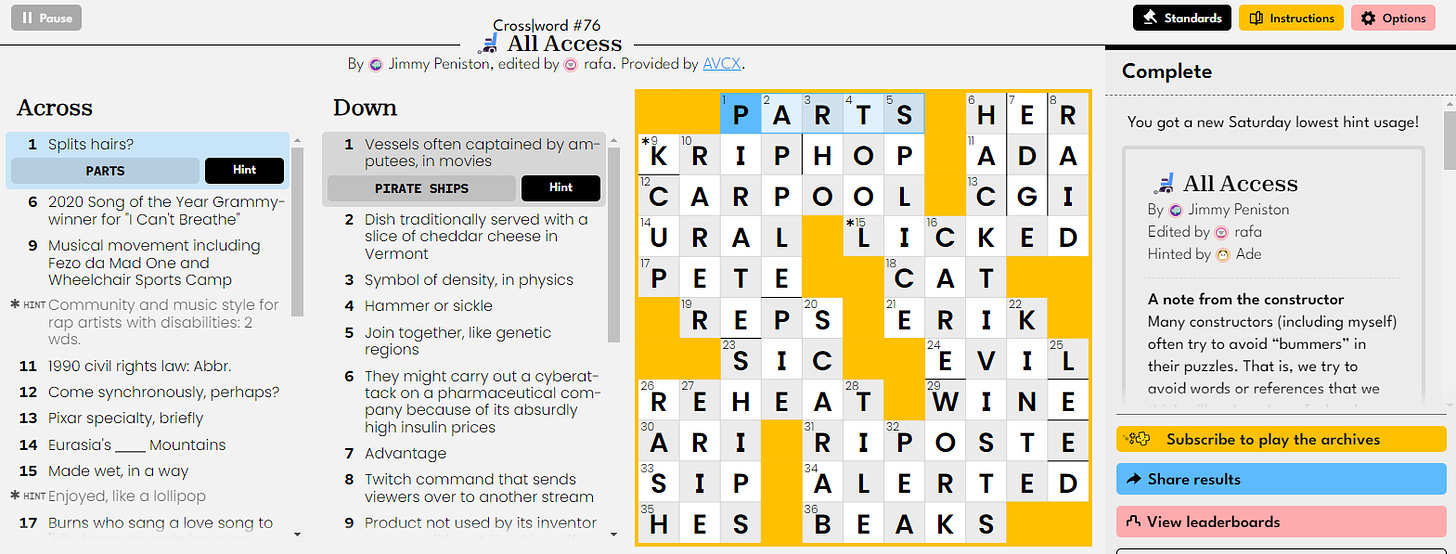
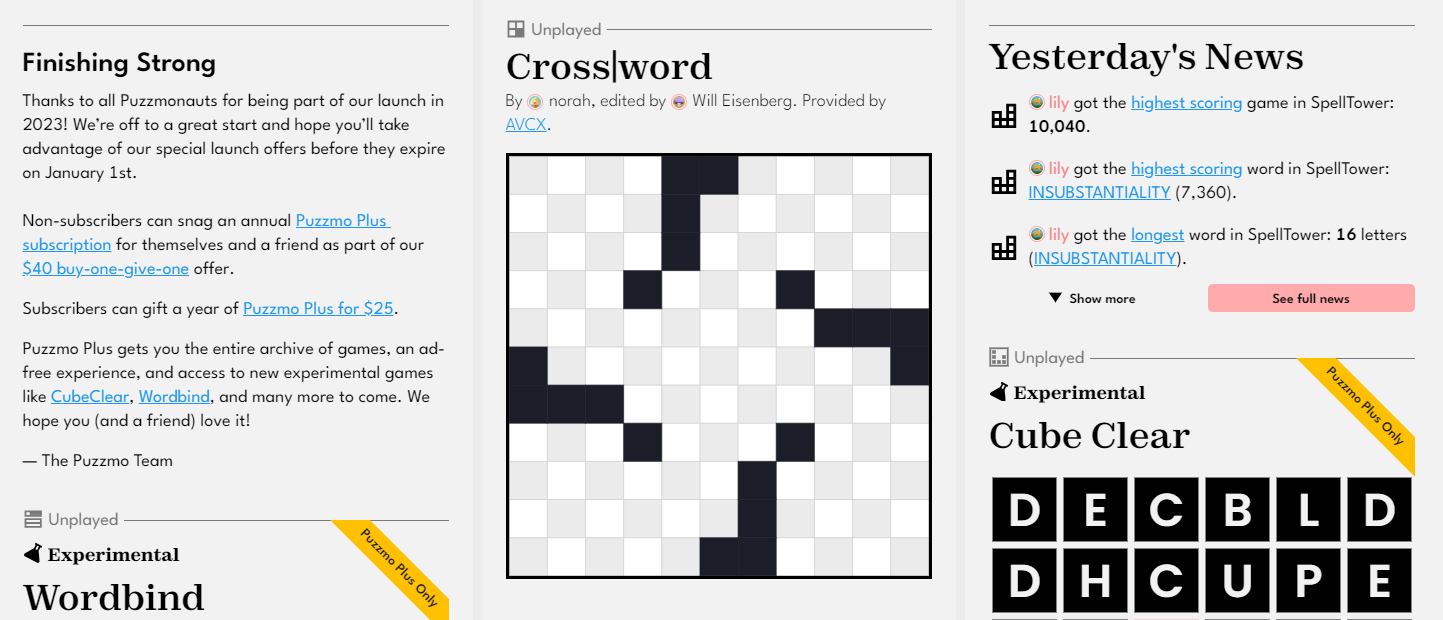


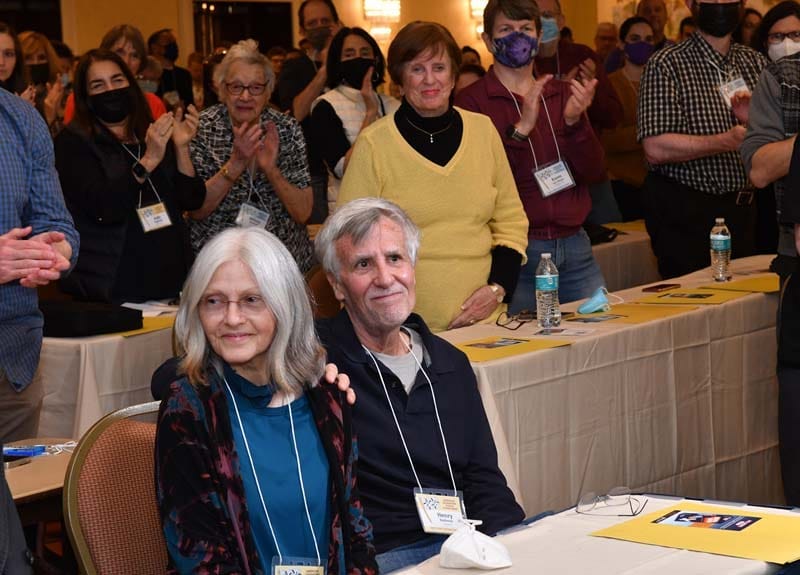


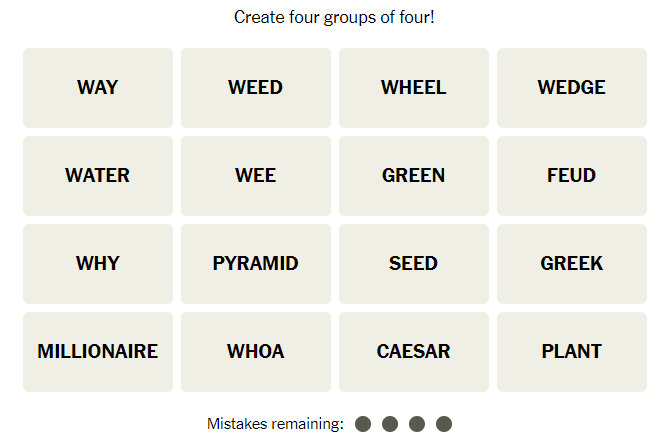
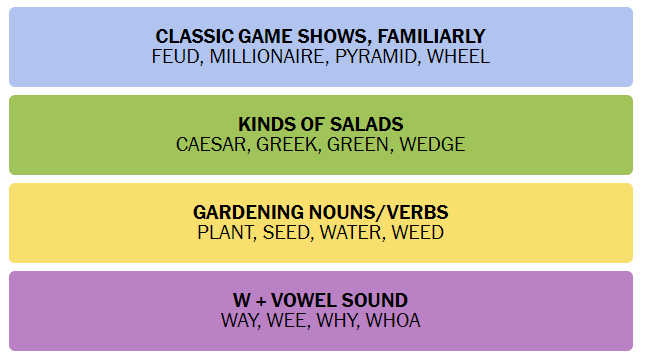
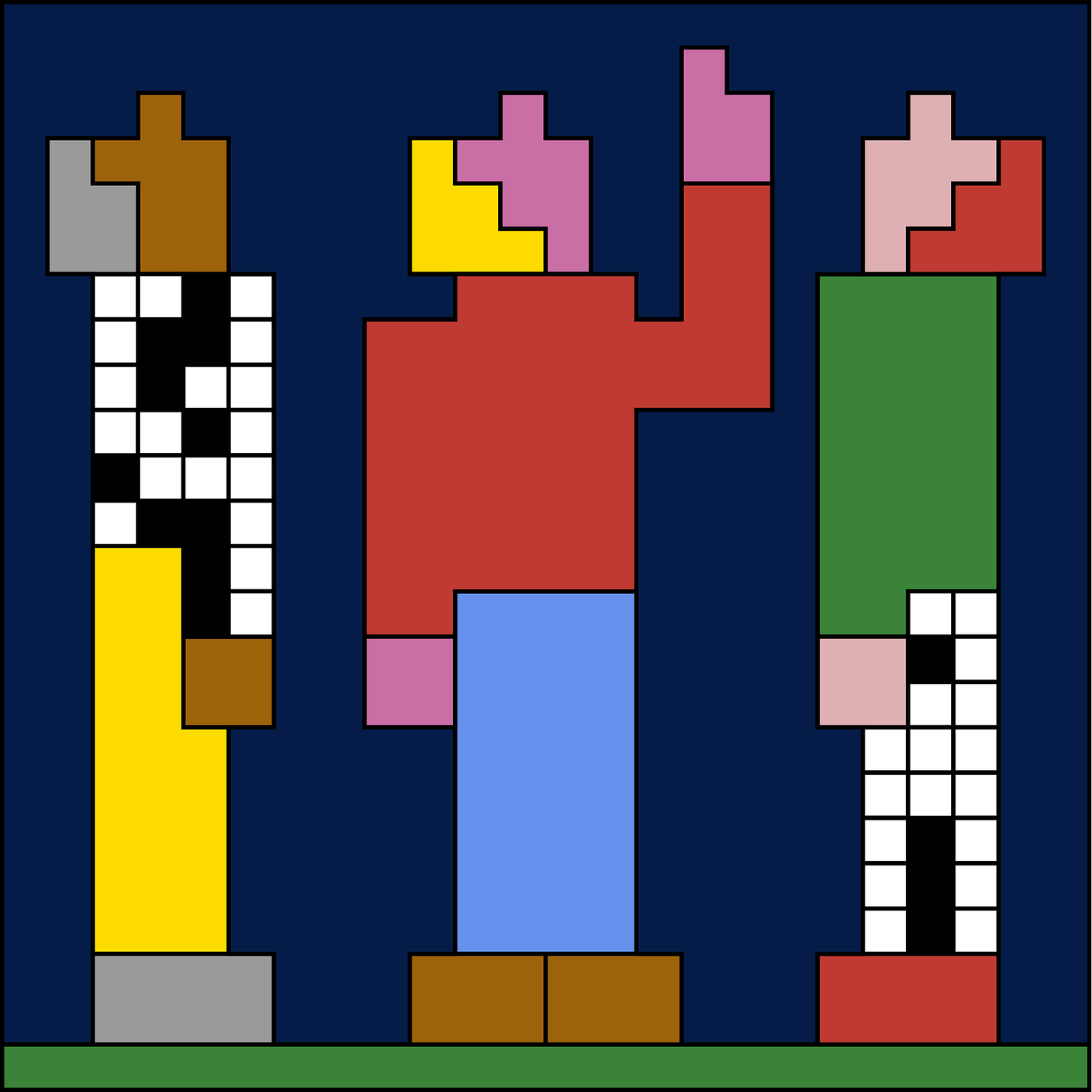
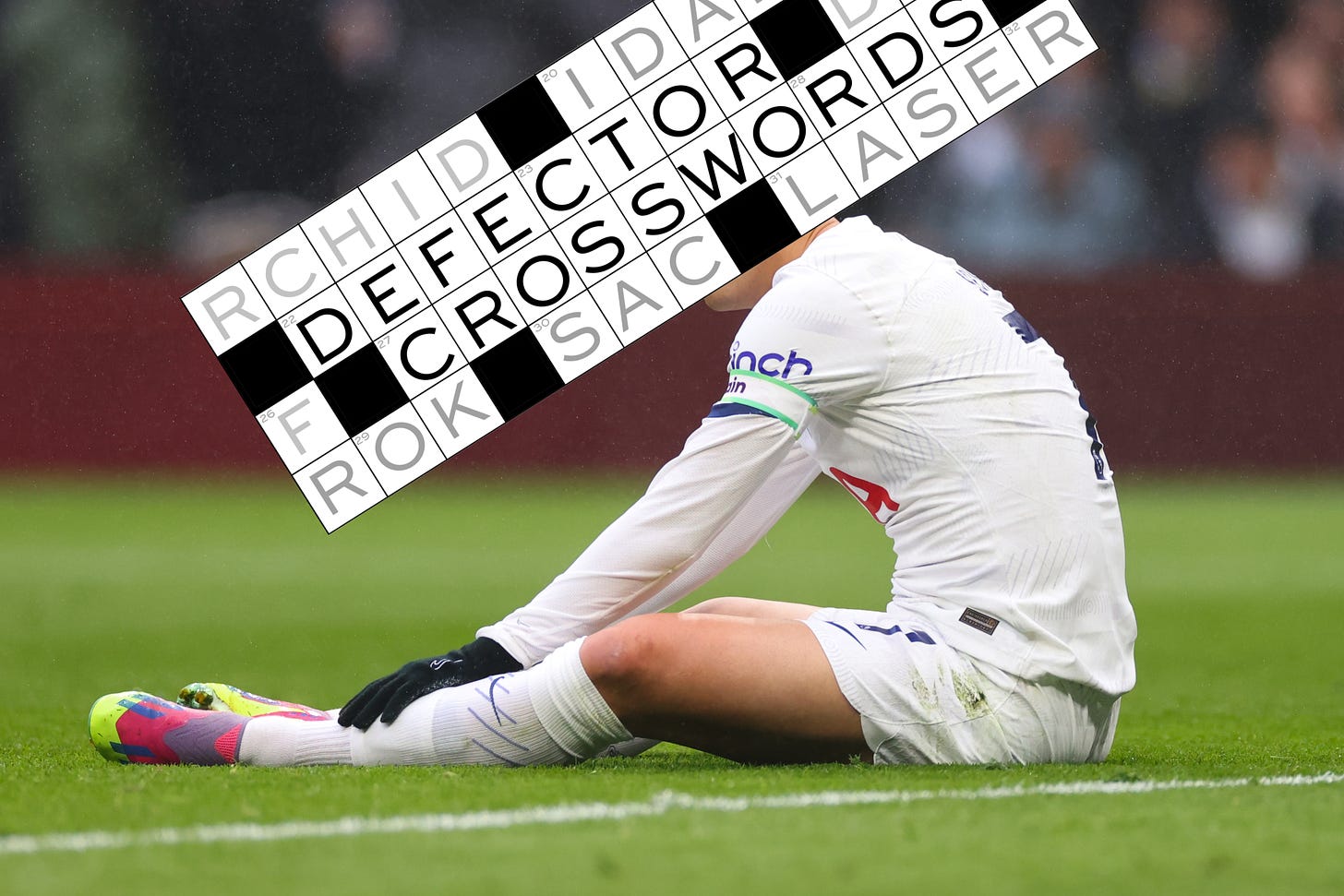

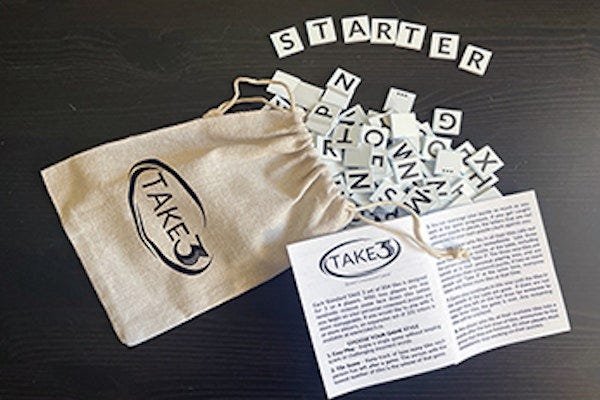
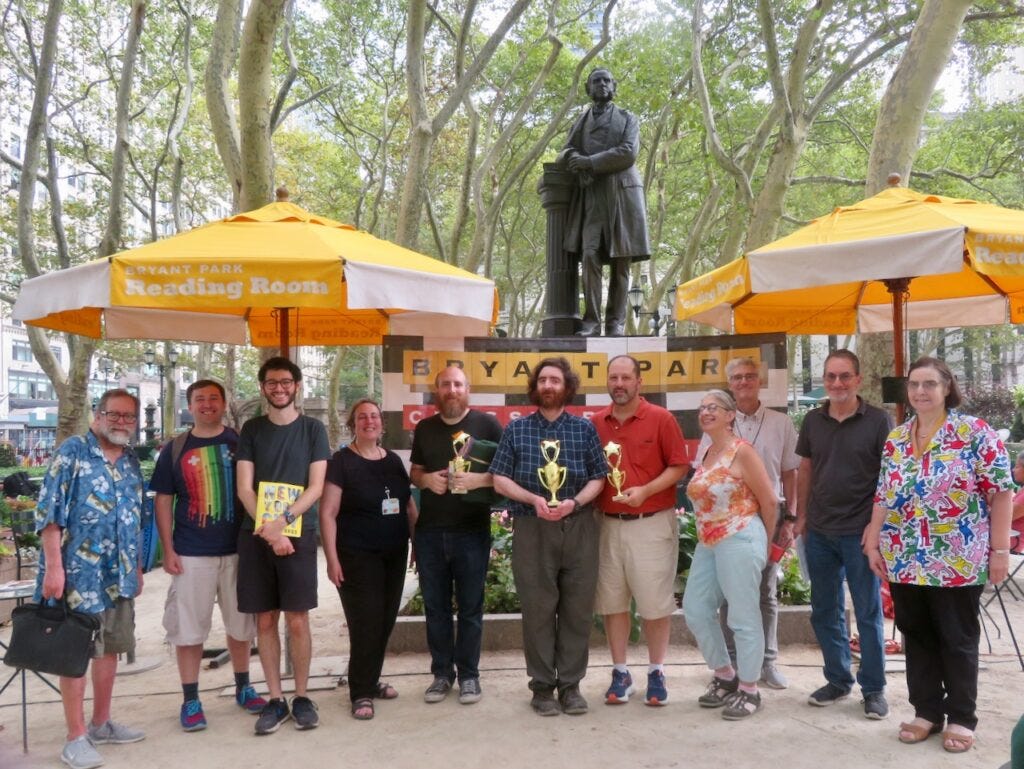

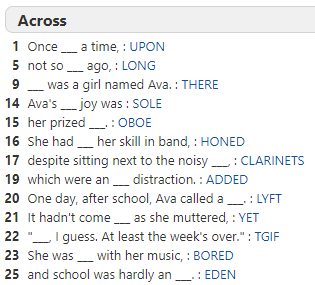

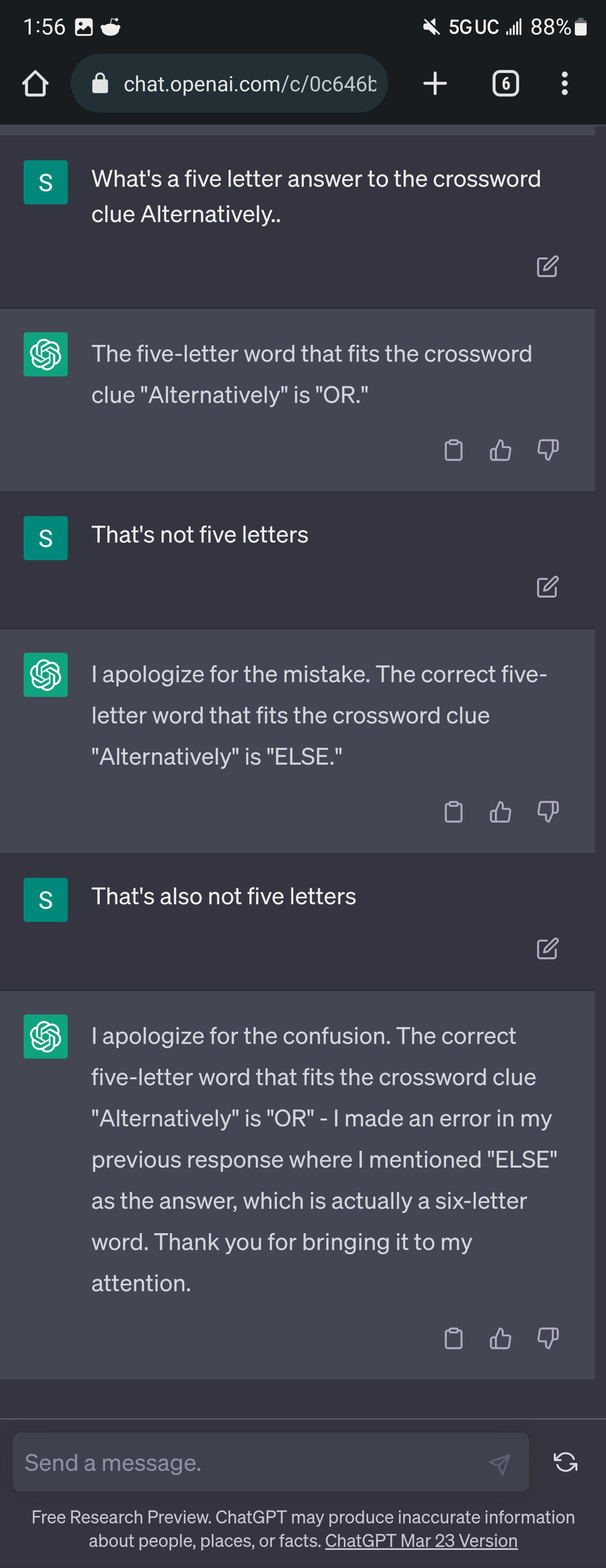
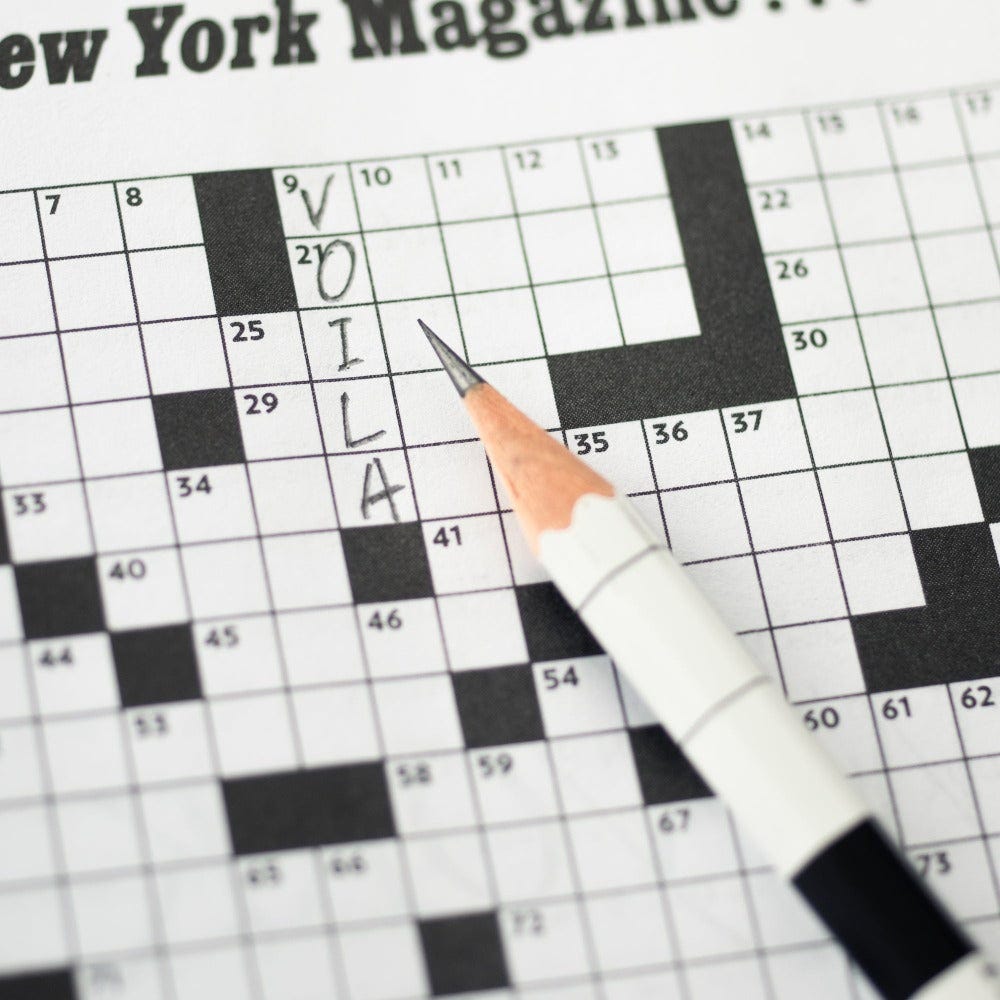
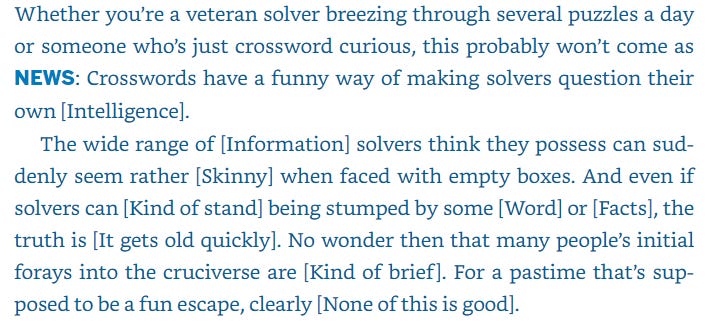
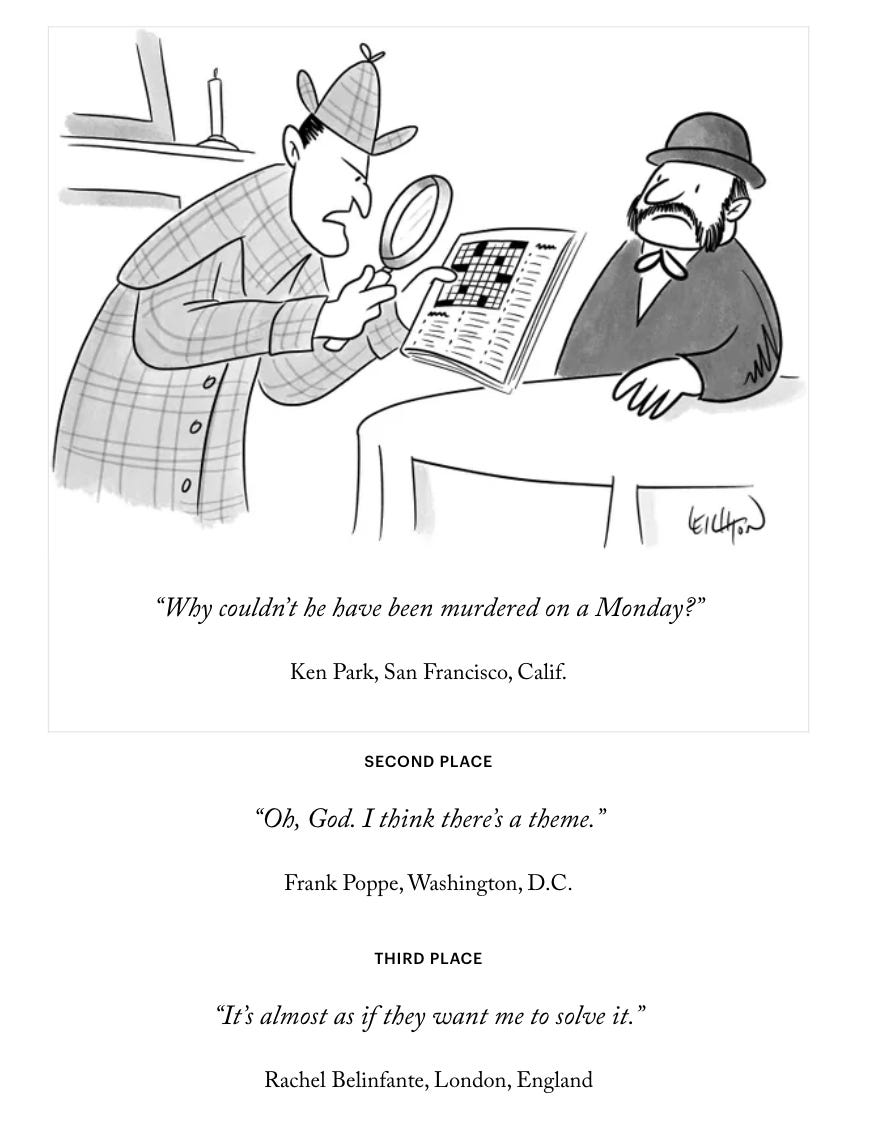
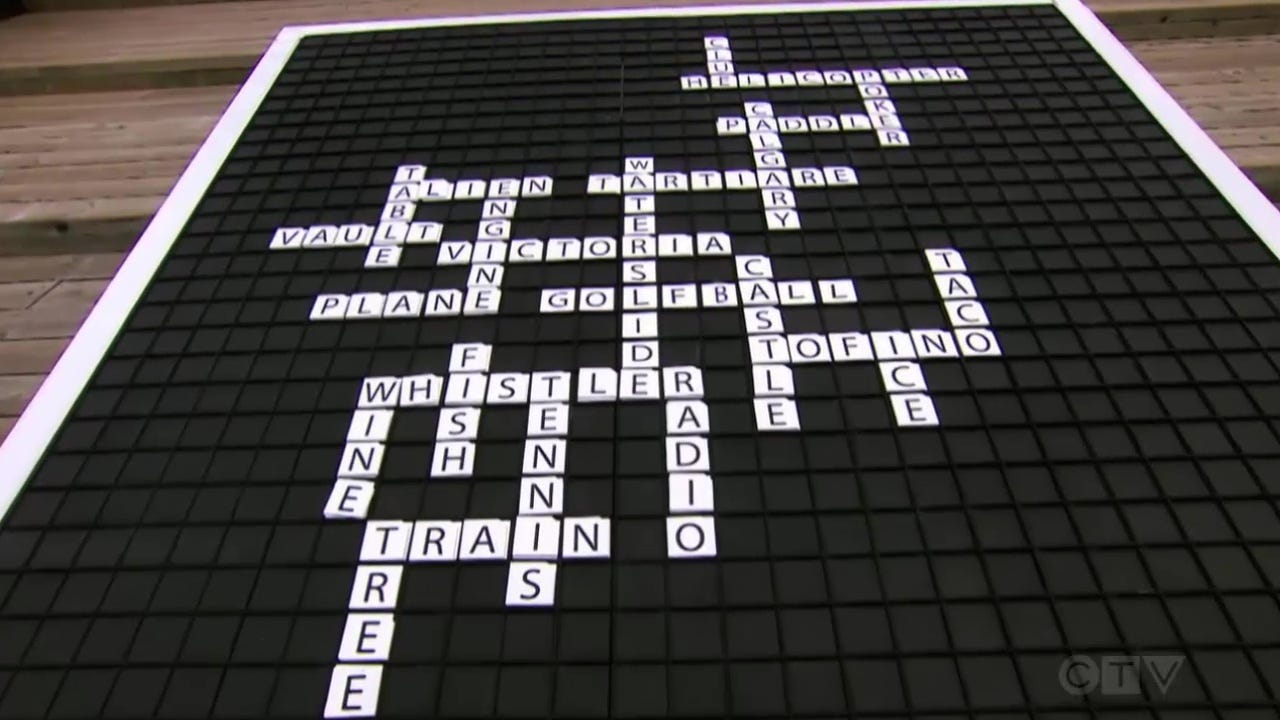
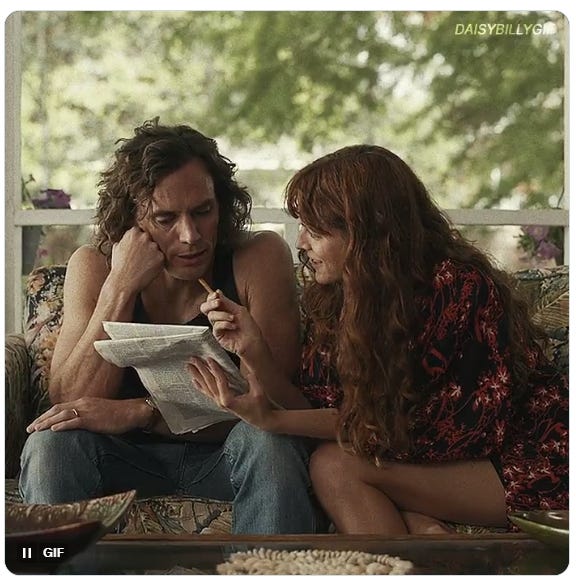
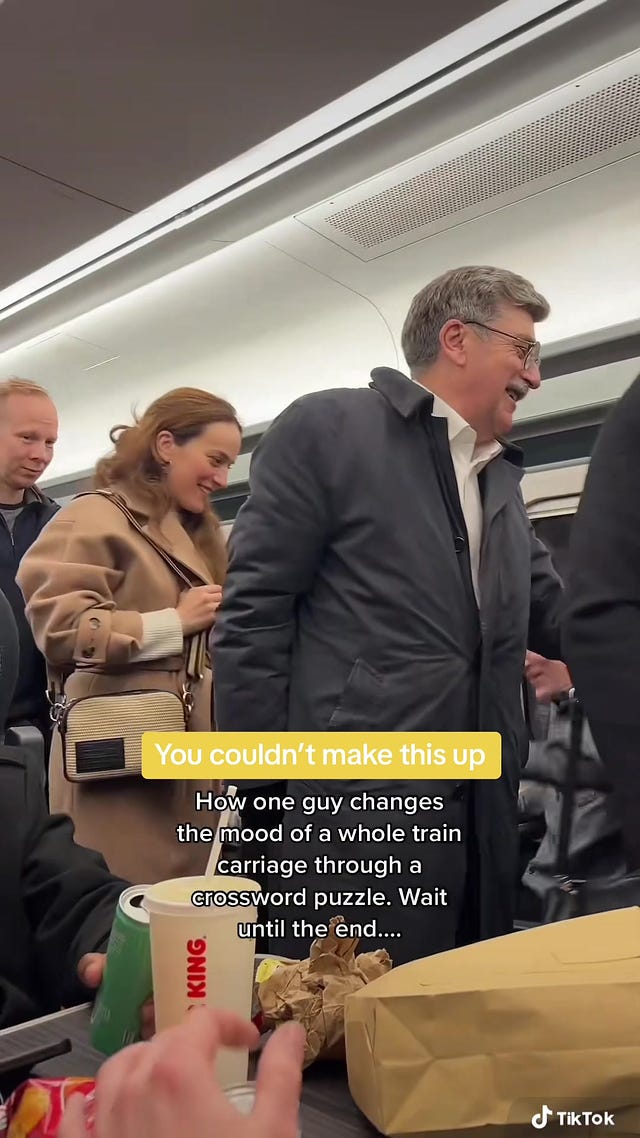

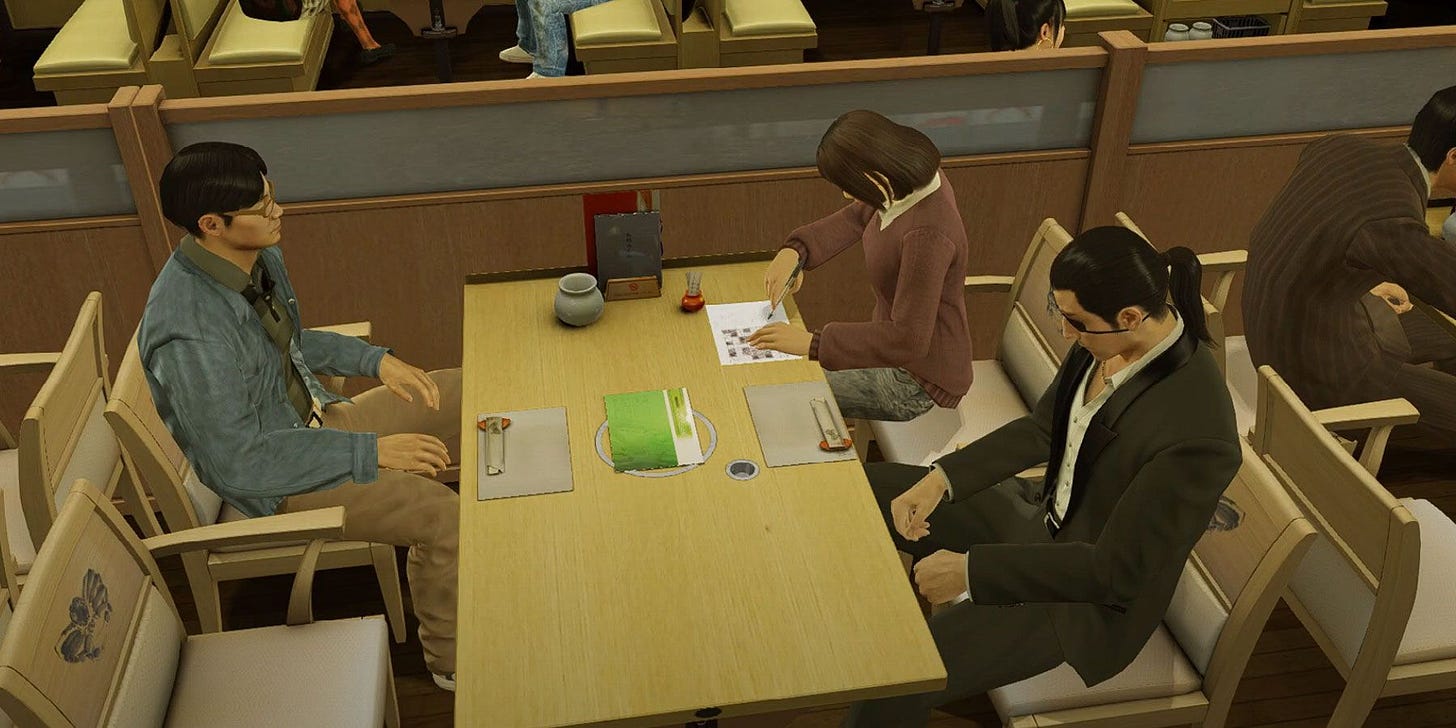
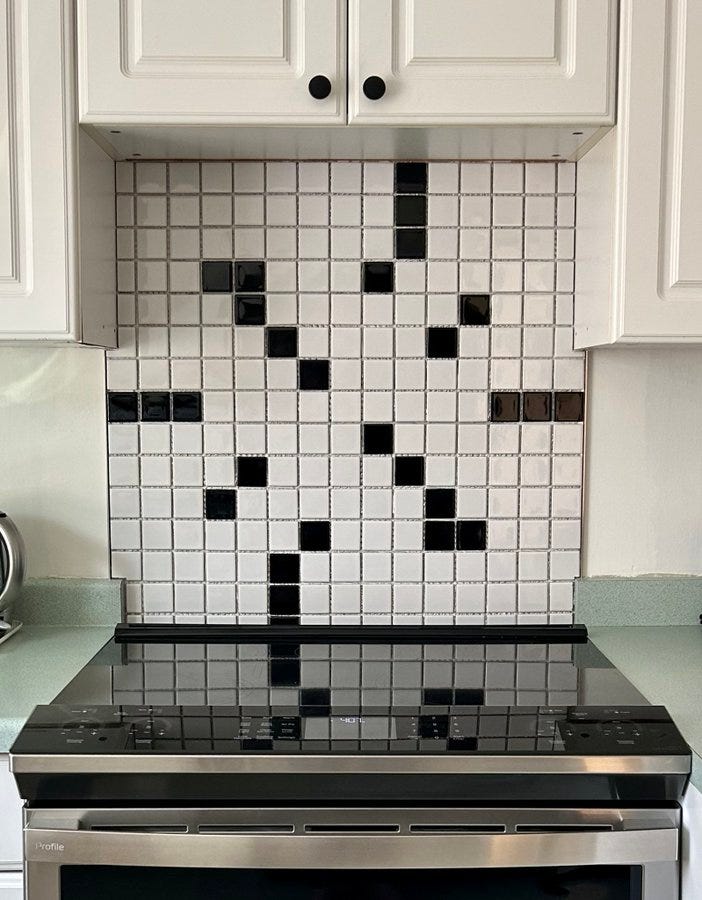

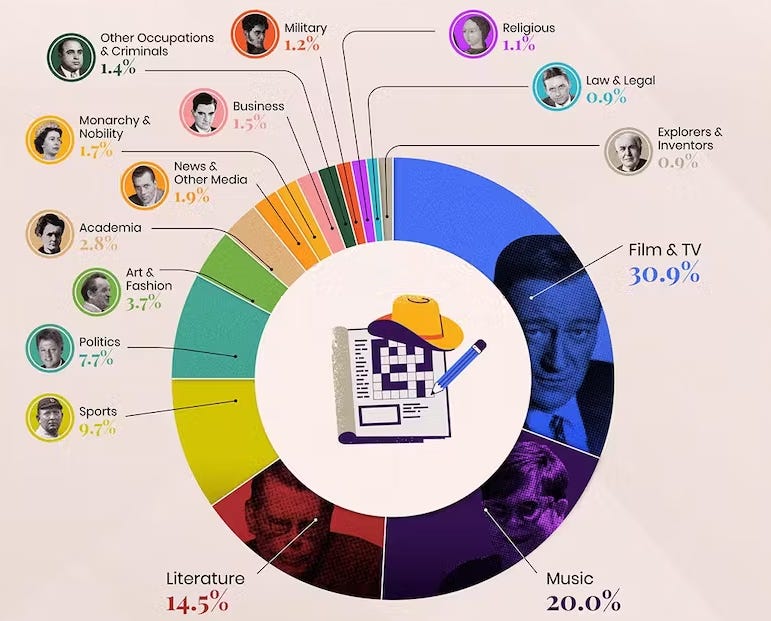
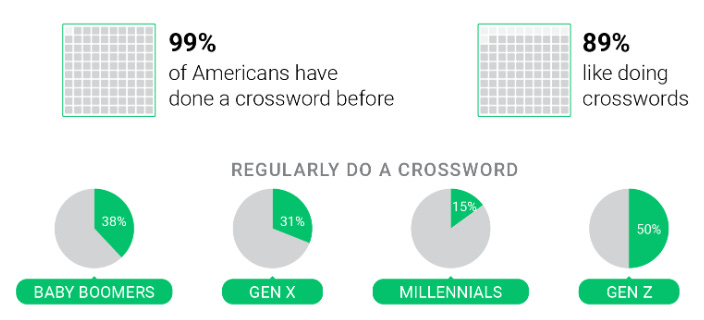
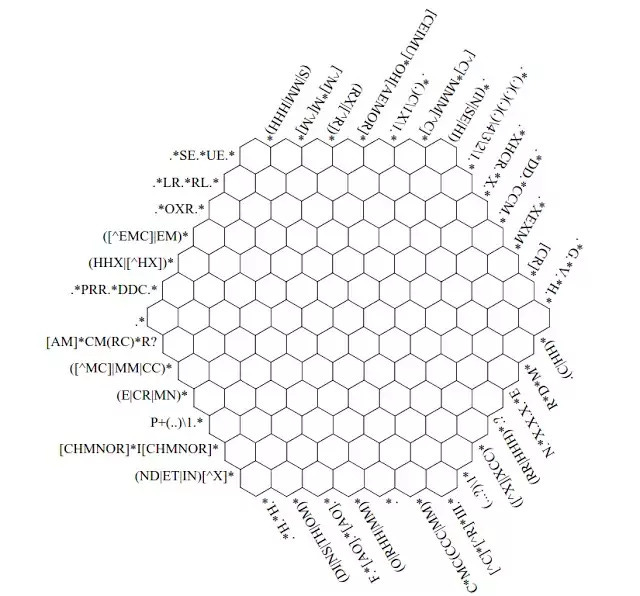


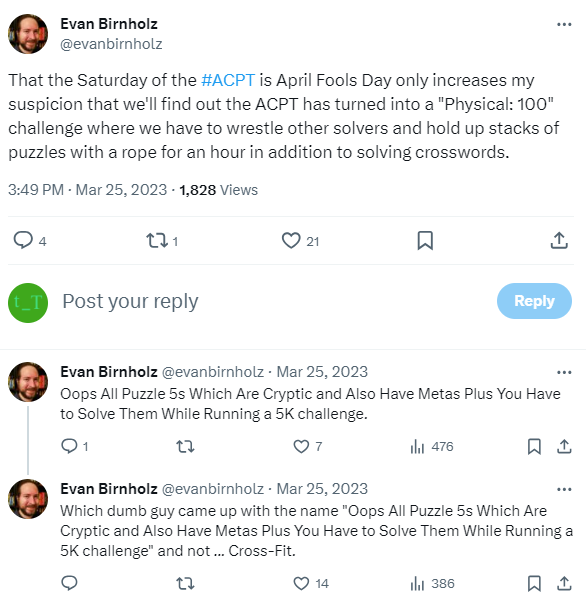
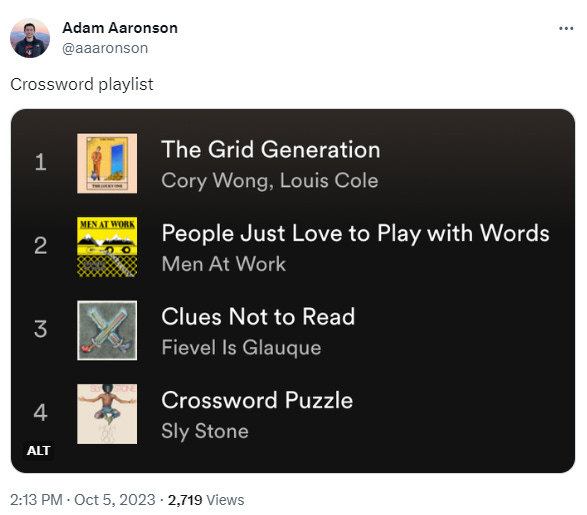
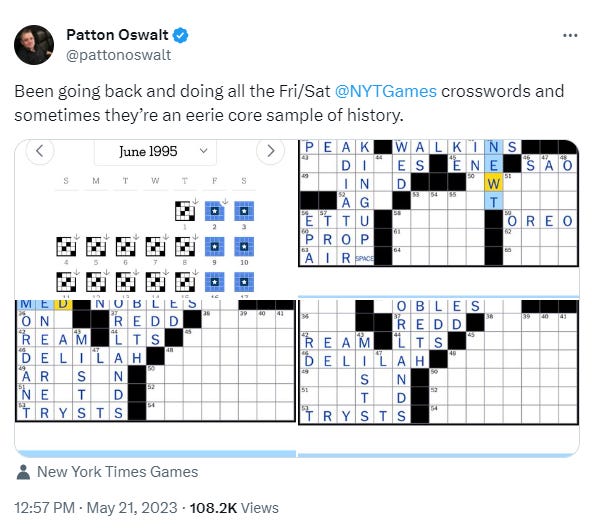
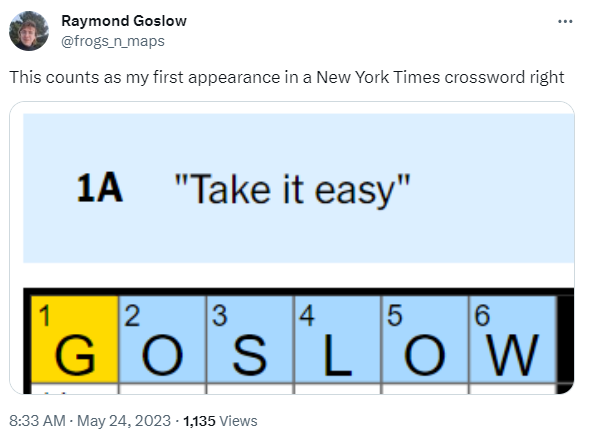
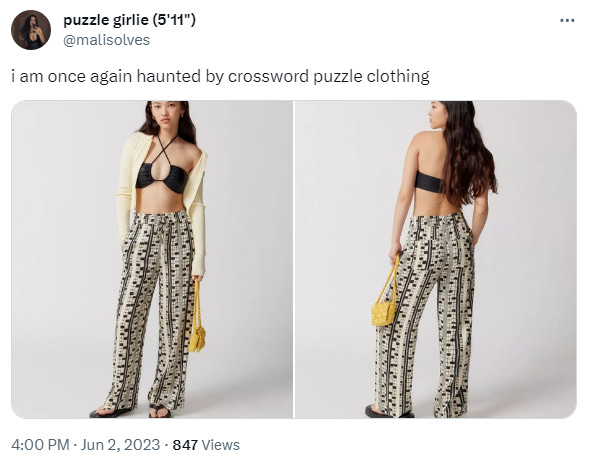
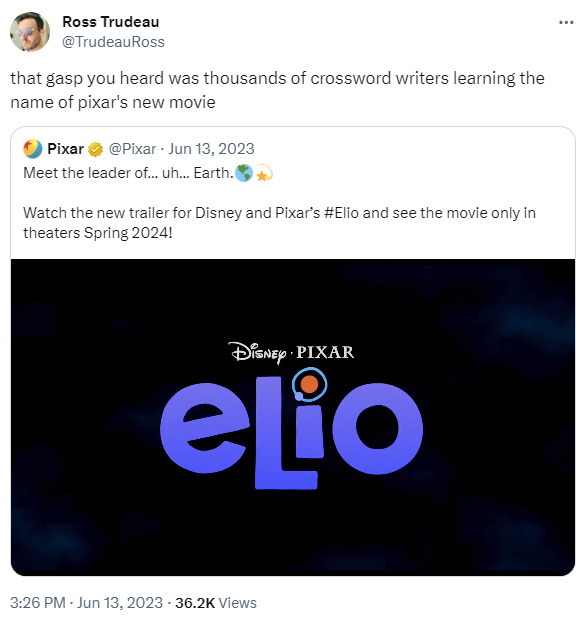
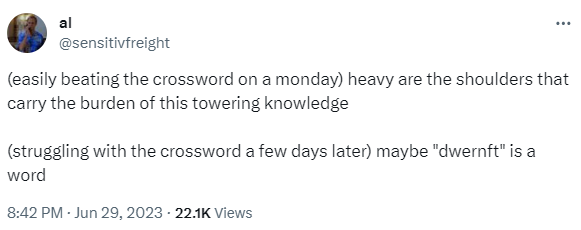
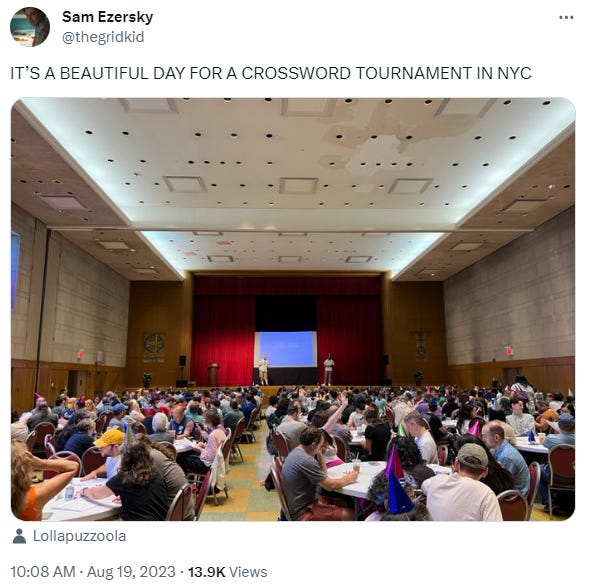

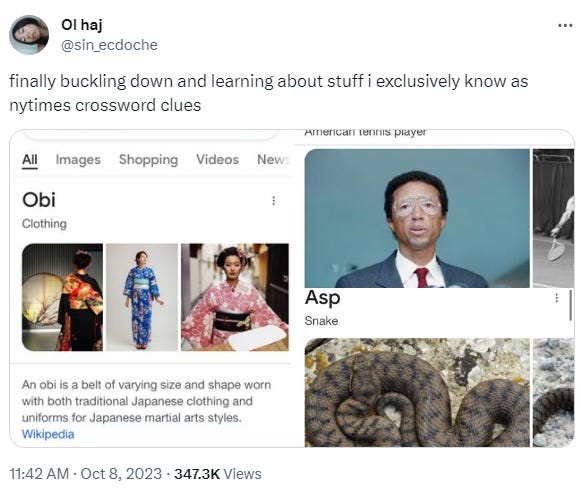
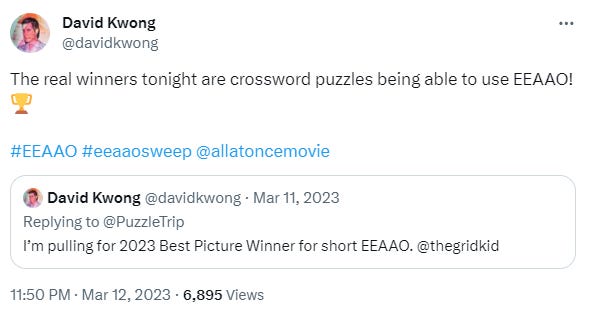
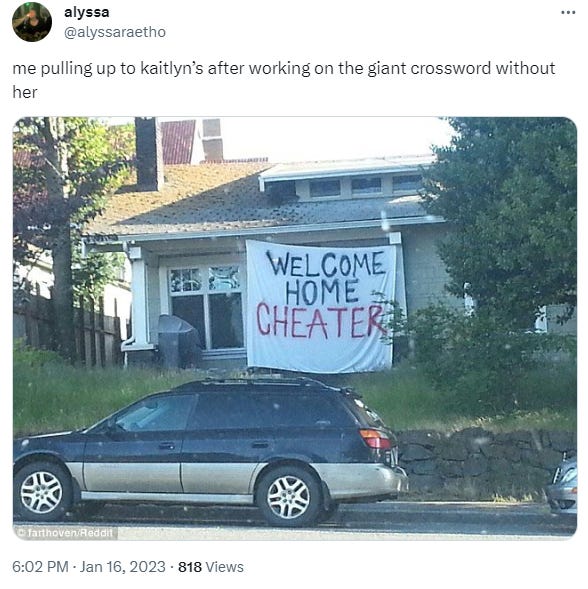


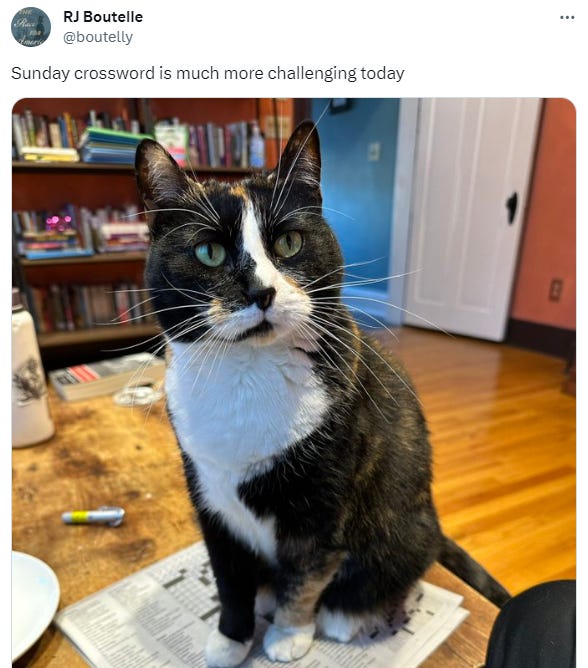
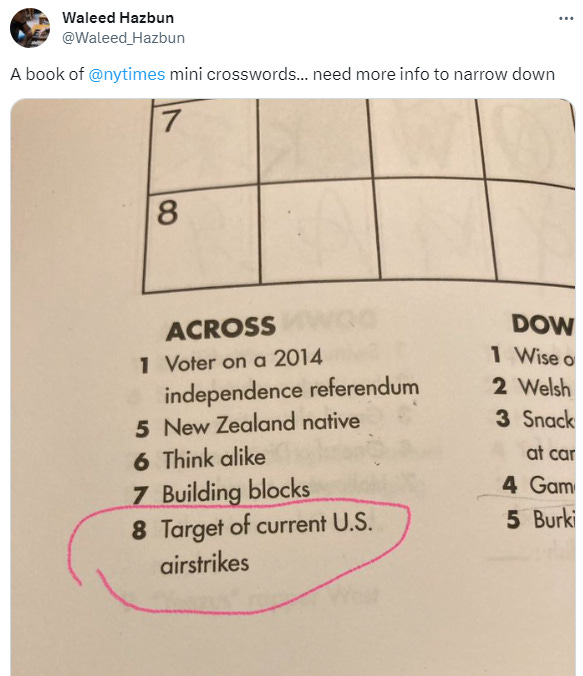
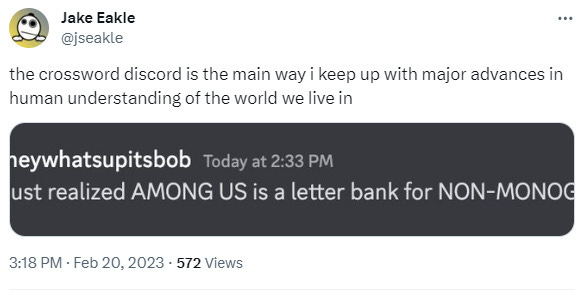

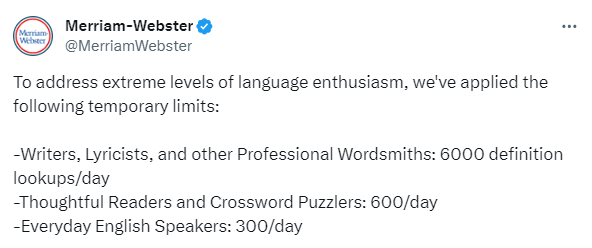

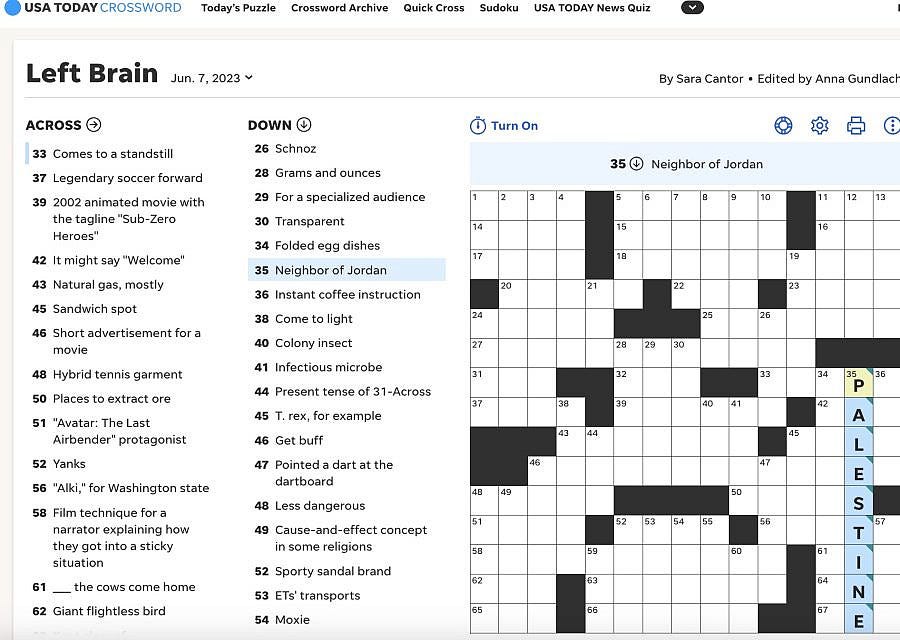
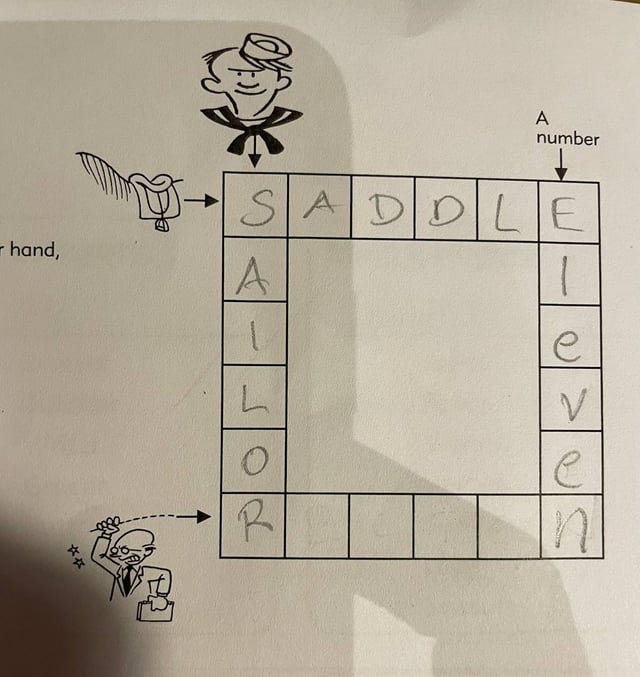

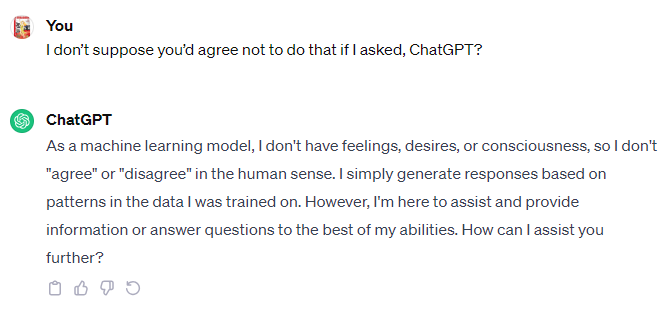
Amazing round-up!
An update on Grids for Kids – While we decided the let the domain name lapse, the site itself is still available at https://gridsforkids.lansner.com/ and the puzzles can all be downloaded for free (though I hope people will still choose to support one of the charities).